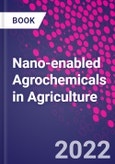Nano-Enabled Agrochemicals in Agriculture presents a targeted overview of the safe implementation of nanotechnologies within agricultural and horticultural settings, with the purpose of achieving enhanced production while maintaining ecological integrity. The growing global request for agricultural crops and products requires high standards of quality and safety, which has stimulated the search for new technologies that preserve their quality and delay their decomposition. Nanotechnology may boost plant production by improving nutrient uptake/use efficiency with nanoformulations of fertilizers and agrochemicals for plant enhancement, detection and treatment of diseases, and host-parasite interactions at the molecular level using nanosensors. It also may improve plant disease diagnostics, removal of contaminants from soil and water, postharvest management of vegetables and flowers, and reclamation of salt-affected soils.�
Although the markets for nanoproducts and nanoformulations continue to increase, there are also growing concerns regarding the fate and behavior of nanomaterials in environmental systems. Exploring important topics related to nanotechnology and nanomaterials, the book includes the use of nanochemicals in insect pest management, as nanofungicides, nanoherbicides, micronutrient supply, and nanosensors to monitor crop and soil health conditions, from detection of agrochemicals to their slow release of agrochemicals, and their impact on related environs.�
This book will serve as an excellent resource for a wide range of plant scientists who have concerns about nanomaterial interactions with terrestrial and aquatic plants.�
Please Note: This is an On Demand product, delivery may take up to 11 working days after payment has been received.
Table of Contents
1. The Role of Nanotechnology to Combat Major Recent Worldwide Challenges
2. Classification of nanomaterials and their physical and chemical nature
3. The theory of relativity effect in nanoparticles: Deciphering of unknown effects
4. Eco-friendly routes for obtaining nanoparticles and their application in agro-industry
5. The mechanism involved in the synthesis of biogenic nanoparticles
6. Advanced analytical techniques for physico-chemical characterization of nano-materials
7. Nanotechnology for cargo delivery with a special emphasis on pesticide, herbicide and fertilizer
8. Nano-biofertilizers for enhanced nutrient use efficiency
9. Nanopriming technology for improving crop plants under stressful conditions: concepts and methods
10. Applications of nanotechnology in precision agriculture
11. Applications of algal nanoparticles in agriculture
12. Silver and zinc nanoparticles in improvement of agricultural crops
13. Biogenic nanoparticles and their application for removal of organic contaminants from water and wastewater
14. Stimulatory role of nanomaterials on agricultural crops
15. Green Synthesis of Nanoparticles and their uses in Agriculture
16. A Comprehensive Review on Nanopesticides and Nanofertilizers- A boon for Agriculture
17. Nano-enabled Agrochemicals for Sustainable Agriculture
18. Encapsulation of Fungicide Nanoparticles Using Functionalized Graphene and its Application against Phytopathogenic Rhizoctonia Solani
19. Nanotoxicity based studies (phytotoxicity, cytotoxicity, genotoxicity and ecotoxicity) in agriculture
20. Engineered nanomaterial-mediated changes in growth and development of common agricultural crops
21. Biosynthesis and green synthesis of nano-particles and their use in agriculture
22. Nanoparticle-based solutions for diagnosis and management of fungal plant pathogens
23. Current Status and Future Prospects of Nanoparticles as plant genetic materials carrier
24. Current developments in nanotechnology for the growth of different industrial sectors: 2010-2020
25. Impacts of nanomaterials on metabolic profiling of agricultural crops
26. Polymeric Nanoparticle-based Insecticide: a critical review of agriculture production
27. Nanodelivery System: In the agriculture sector
28. Nanotechnology, a new tool for agriculture and agroindustry
29. Synthesis of different TiO2 nanostructures using Central Composite Design optimization method and application of TiO2-nanobelt for water microorganism's purification
Authors
Mansour Ghorbanpour Department of Medicinal Plants, Faculty of Agriculture and Natural Resources, Arak University, Iran..Dr. Ghorbanpour obtained his MSc. and Ph.D degrees in Crop Ecology from Tehran university (Karaj, Iran), and has been a visiting scholar in the Nutrient Uptake and Toxicity Stress (NUTS) group at the University of Western Australia, Perth, Australia. He specializes in medicinal and aromatic plants production and domestication. His research interests include medicinal plants and their bioactive Ingredients under stressful environments, discovery or development of new therapeutic plants/and products, phytonanotechnology, bioavailability of emerging contaminants in plant-soil systems, agricultural practices/techniques for increasing plant primary and secondary metabolites, Diversity of natural products and bioactive compounds of aromatic medicinal plants, etc.
Dr. Ghorbanpour has published over 160 journal articles, 55 book chapters and 12 book volumes. He was listed as "Top 2% scientists of the world� in 3 consecutive years (2019-2021) by Stanford University USA
Muhammad Adnan Shahid North Florida Research and Education Center. Dr. Muhammad Adnan Shahid is a faculty member at the Horticultural Sciences Department, University of Florida/IFAS, North Florida Research and Education Center. Dr. Shahid has also worked at Cornell University and University of Florida, as post-doc and research scientist, respectively. His areas of expertise include plant physiology and biochemistry, nutrient and water management, plant growth regulators, abiotic stresses, and hydroponic/aeroponic systems. Dr. Shahid has published research articles in peer reviewed journals and seven book chapters. He is also serving a reviewer of various scientific journals and serves as co-chair for Northeast Greenhouse of Conference, USA. It is the association of scientist and growers in New England region in USA.







